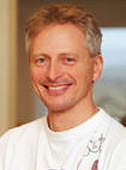To the Editor

Christian Bang
|
I would like to comment on
Professor Richard Reznick's concerns
about surgical training in
Canada.
Upon completion of my residency
in Denmark, I was keen to
experience a new training environment.
While taking a course
in New York, I learned about
Toronto; I was advised that its
microsurgical centre was world
class. I applied for a position in Toronto and during 2001
and 2002 I spent a total of one year as a microsurgical
fellow in plastic surgery at the Toronto General Hospital.
I was not disappointed for a single second with my experience.
Dr. Peter Neligan and Dr. Ralph Manktelow acted
as my mentors. Indeed, they have both been the most
important colleagues throughout my career, clinically and
personally. Several other surgeons also contributed greatly
to my extraordinary Toronto experience. It was gratifying
and stimulating to work with a team of skilled surgeons, all
of whom took part in the clinical and theoretical training.
In many ways, my year in Toronto represented an important
turning point in my life, and it is with great gratitude
that my family and I reflect upon that time in our lives.
I fully acknowledge the concerns outlined in Dr.
Reznick's article. To bolster his argument, I would like
to describe the Danish post-graduate training, which is
similar to that in other European countries. In my opinion,
there are two key differences between the Danish
and the Canadian systems.
|
Firstly, the Canadian post-graduate educational system
is characterized by the very serious way in which
students, residents and staff work together. The students
and residents are regarded by the staff as valuable
resources, and in many ways, as colleagues. This creates
an inspiring environment in which residents, at an early
age, may take part in the department's diagnoses of
patients and treatments at an advanced level.
Secondly, the Canadian physicians work significantly
more hours than their Danish counterparts. Whether positively
or negatively, the very strong union culture within
Denmark significantly influences the residents' lives. One
of my younger colleagues is a resident at a university
hospital and currently is on-call every fifth weekend as
well as once a week. As a result of this schedule, he works
only three days a week (including his on-call time). He
has six weeks of vacation time plus four extra days off due
to the fact that he has young children. An additional five
weeks are scheduled for courses. A system thus structured
fosters deep frustration amongst the doctors. Surgical
training suffers dramatically. Under the existing system,
it is impossible to acquire the necessary surgical skills
and clinical bedside experience. A common complaint
expressed by Danish patients is that they meet too many
different physicians. Consequently, there is a lack of continuity
in the care and treatment of the patients, and no
significant doctor-patient relationship can be established.
The pendulum has swung too far in Denmark.
Ultimately, it is the patients who suffer when there is
insufficient post-graduate education and very stringent
restrictions on physician working hours.
Christian Bang
chr.bang@sol.dk
Odense, Denmark
|